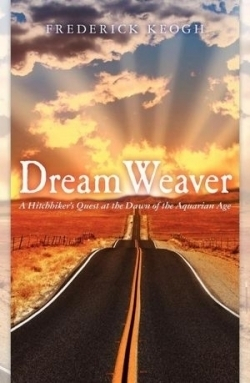Dream Weaver
A Hitchhiker’s Quest at the Dawn of the Aquarian Age
Less a memoir than one man’s treatise on America in the early 1970s, Frederick Keogh’s Dream Weaver exposes both the spiritual void and the deceptive mysticism of a generation emerging from the upheaval of the 1960s.
Keogh sticks out his thumb and rides into and out of the lives of the numerous drivers and miscellaneous others he encounters on his cross-country hitchhiking journeys. And while he states that “scarcely any memories remain” of his expeditions as “there are no notes to rely on,” specifics abound in a freakish recall of detail and memory lapses seem to be few, which sometimes tests the limits of the author’s credibility.
Dream Weaver is a very well written book, and the copy is amazingly free from errors. The stories as Keogh relates them are funny and sad, soothing and frightening; they are all telling and never dull. “This is,” says Keogh, “after everything, not so much a diary as a story of a soul in an era in America.” Clouded in wreathes of pot smoke, awash in beer, high or tripping or otherwise disconnected, Keogh and his fellows not only experience but seemingly represent the very dissatisfaction and quest for “something” that marked the America of the 1970s.
It is Keogh the philosopher who emerges from these tales to tell the true story of Dream Weaver. From the perspective of some thirty-five years later, the author has had much time to dissect and scrutinize his own story and to place it in context within the history and sociology of a much-analyzed era. An erudite writer, he poses theories that may be a revelation to some, particularly to those who did not live through the times. Still, he is certainly not the first to assert, for example, that the televised film Helter Skelter, with its “it could happen to you” message about the Charles Manson murders, served to kill the hitchhiking culture in America.
However, in Keogh’s record, even the ever-present “cheap local beer,” “an aliment that always made everything right everywhere,” comes to represent something—a means of crossing lines among peoples, an equalizer that at least appears to erase class and human distinctions. Keogh seems to ask: isn’t everyone ultimately seeking the same “something”? Whether love or acceptance or simply a true sense of self, the youth of 1974 America, as told through Keogh’s stories, wanted that something and wanted it enough to go after it.
Keogh cast his fate on the open road, downing the mind-altering substances that promised everything from salvation to oblivion and seeking any potential mystical revelation that might provide an answer. Ultimately, he admits, “The failure of my travels could not escape me. In all my wanderings, all this time, what had been gained?” Keogh does not—cannot—answer that question.
Reviewed by
Cheryl M. Hibbard
Disclosure: This article is not an endorsement, but a review. The publisher of this book provided free copies of the book and paid a small fee to have their book reviewed by a professional reviewer. Foreword Reviews and Clarion Reviews make no guarantee that the publisher will receive a positive review. Foreword Magazine, Inc. is disclosing this in accordance with the Federal Trade Commission’s 16 CFR, Part 255.

